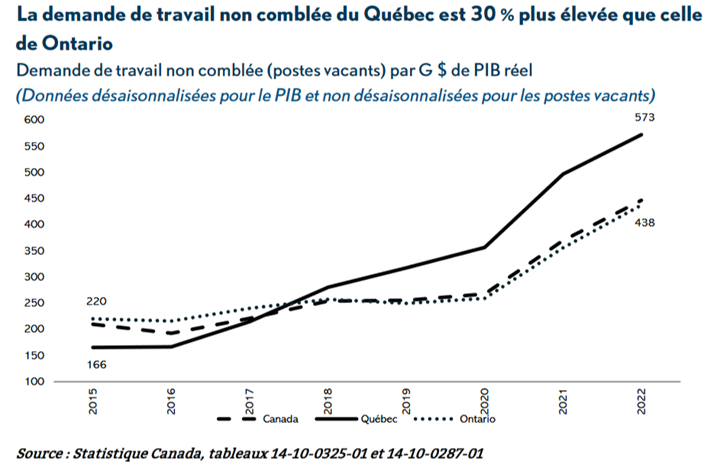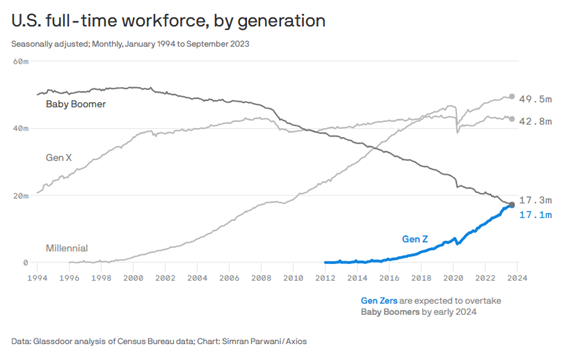Adapting to a rapidly changing environment
While no one can predict the future, we must all monitor market and technology trends in order to anticipate future needs and maintain the employability of all staff. Of course, this must be done by developing plans, but also by encouraging everyone to take responsibility for maintaining their skills and knowledge. By being proactive and adopting a mindset of continuous learning, we can ensure a certain level of adaptability, which is conducive to growing with our company (or another).

This is all the more important given that there is already a gap between employers' needs and candidates' profiles.
To prevent this gap from widening, we must anticipate the disappearance of jobs in favor of artificial intelligence, integrate AI skills into school curricula, and prepare for the emergence of new professions, such as prompt specialists or human-machine team managers.
Rethinking the recruitment cycle
Given that some jobs will disappear while others will emerge, the recruitment process will need to be rethought to make it more creative, but above all more agile. This will make it possible to identify talents who, although they do not perfectly match the desired profile, have potential for development. To achieve this, the process will need to be fluid and incorporate critical thinking about the technologies used, particularly artificial intelligence, in order to avoid excluding candidates whose CVs do not fully meet standard criteria.
If the obsolescence of technical skills requires a focus on cross-functional skills such as creativity, collaboration, and emotional intelligence, companies will need to review the skills they look for in interviews and place greater emphasis on behavioral skills... in other words, the human aspect.
Here are some areas to consider in the recruitment process:
Prioritize interpersonal skills and the ability to learn continuously
It is important to be selective when compiling your wish list: too many job postings are more like compulsive hoarding than a carefully considered profile that meets a clearly defined need.
Know-how can be learned. Possibly “on the job,” given the speed of change (after all, didn't we all learn to use ChatGPT as soon as it became available?). Our ability to develop new skills will therefore be more important than knowledge itself. When it comes to interpersonal skills, learning is more delicate. It's a safe bet that, regardless of the field, the skills sought after include emotional intelligence, resilience to change, creativity, and critical thinking. The ability to adapt, learn continuously, and collaborate effectively also seems particularly important for the jobs of tomorrow, since we don't know what they will be.
Valuing the individual and their fit with the corporate culture
A resume has never defined anyone. What matters is who you are, what makes you tick, your values, and your motivations. It is essential that these personal traits align with the values of the team and the company, as they are more difficult to change. The fact that certain skills are lacking is not very important, since they can be learned. In fact, some employees are very proactive in managing their skills: they do not hesitate to point out what they need to learn in order to stay up to date or improve. This approach is always appreciated by managers, whose roadmap is already full.
The integration process is key... now more than ever!
Integration must go far beyond a friendly “Welcome to the company, here's your workstation!” During her latest conference at the CRHA Congress, Sonia Lupien emphasized the need for long-term integration, in person, with the manager. All too often, this integration period is a missed opportunity to equip a new hire with the tools they need and help them find their place in their new environment. Once everything is hunky-dory and both parties are happy with their collaboration, it's important to keep going. It's rare that people commit to each other for life.
Co-create aligned career paths
To ensure maximum retention, HR teams and managers must develop development plans that are aligned with business objectives and the professional aspirations of staff. When companies organize themselves to develop skills development plans for their teams based on business objectives, they also give each individual the responsibility to take charge of their own development and invest in themselves. After all, skills remain with the person who developed them when they leave the company.
The situation still leaves room for a lot of uncertainty, and it is understandable that, in order to deal with this, organizations are drawing up skill profiles for their employees or modeling existing skills. This makes it possible to target gaps, ensure knowledge transfer, anticipate departures, and facilitate internal mobility.
A bright future

The transformation of the labor market we are currently experiencing opens up fascinating and promising prospects, albeit sometimes challenging ones. This period will be conducive to unprecedented opportunities, such as strengthening intergenerational mentoring to promote a genuine exchange of knowledge between all generations, beyond traditional patterns.
Companies will also be led to rethink talent management by co-constructing tailor-made career paths, aligned with constantly evolving skills, and in direct collaboration with staff members. In addition, emphasis will need to be placed on developing leadership skills, particularly to help middle managers navigate a VUCA (volatile, uncertain, complex, ambiguous) environment.
AI will play a key role in optimizing administrative and recruitment processes, reducing repetitive tasks and improving the candidate experience while combating potential bias. However, constant vigilance will be necessary to ensure that these technological tools remain fair and inclusive.
Finally, organizations will need to foster a culture of adaptability and innovation, highlighting their values and employer brand to attract diverse talent. Anticipating trends, using technology wisely, and asking the right questions will be key to making this transition a success.
To go further:
Sources :
1. Dell – Emerging Technologies’ Impact on Society & Work in 2030
2. Inc. 7 Jobs That Don’t Exist Today but Will in the Next 5 Years Because of AI










